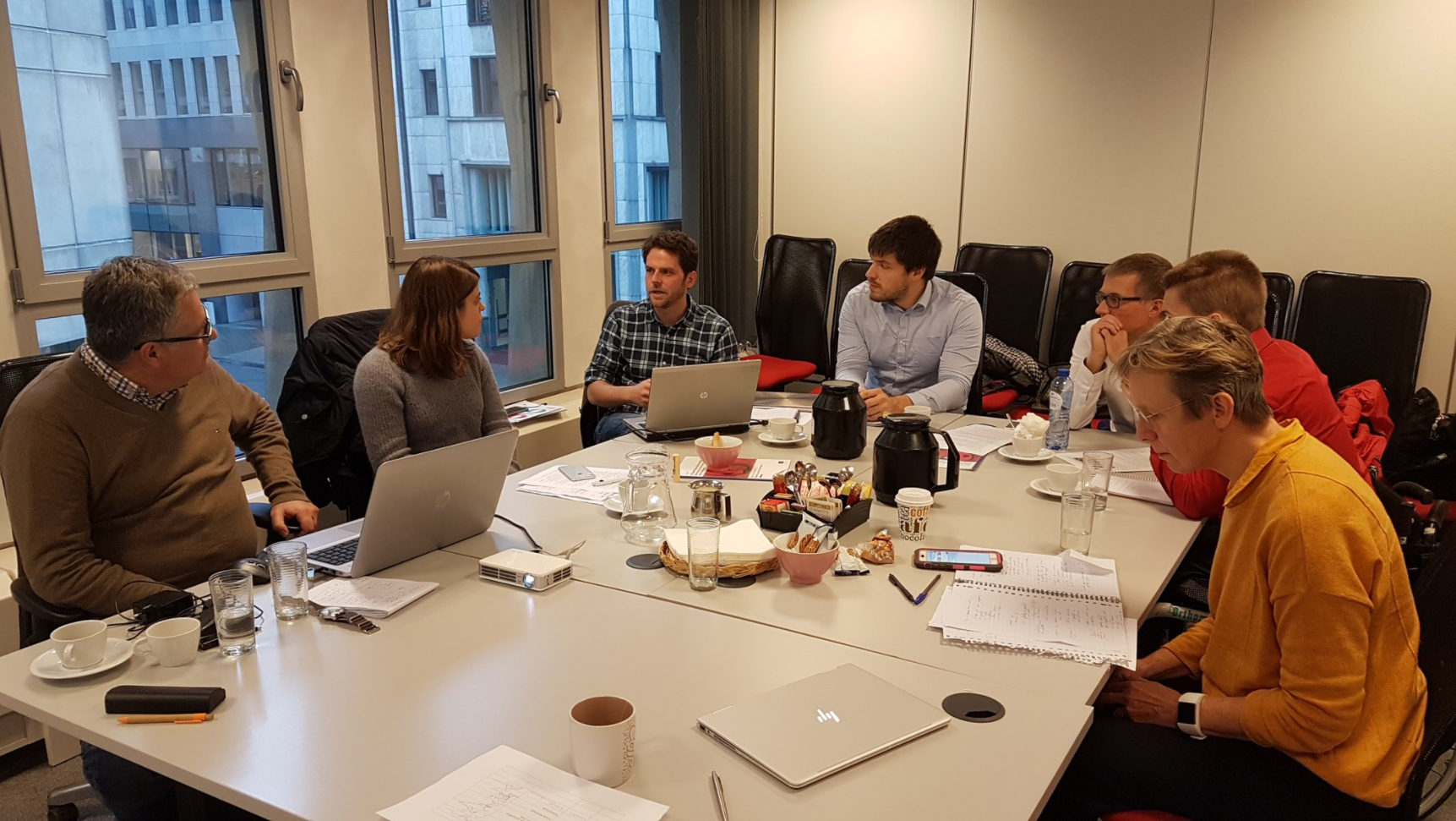Click here for the easy-to-read version
„Families of people with complex support needs often encounter a lack of tailored and safe support,” José Smits, Inclusion Europe’s secretary-general, highlighted at an open discussion organised by Inclusion Europe.
The discussion feeds into a policy paper on “Community living for people with complex support needs” which is currently being drafted by Inclusion Europe.
The meeting, which was attended by representatives from the European Network of Independent Living (ENIL) and Autism Europe, as well as other organisations from the Netherlands, Germany and Spain, revolved around three areas:
- People with complex support needs are often presumed to be unable to be included in the community
- They face a lack of personalised support
- Their families are also discriminated against as they lack support
To address these problems, participants discussed the benefits of a global approach, focusing not only on policy-makers but also families, teachers and service providers.
The points raised included
- Making sure that service providers are trained to support people with complex support needs. This includes learning how to communicate in non-verbal ways (for example alternative and augmentative types of communication)
- Drawing up a continuous monitoring framework where people with complex support needs and their families are included to ensure that the new services are truly respectful of the individual.
- Retraining professionals who previously worked in institutions on how to provide a different, more person-centered type of support.
A person-centered approach: the key to community living
Regarding this last aspect, a person-centered approach ensures that the supported person’s will and preferences are respected.
For instance, the use of a “personal passport” including all the information on the person’s way to communicate facilitates non-verbal communication. It also helps centralizing the accumulated experience of both family and carers in interacting with the person.
Replacing the supply of services with direct payments to the person being supported also helps to strengthen person-centered assistance. The persons concerned can then better control which type of support they receive and employ their personal supporter, which makes them switch from a passive to an active role.
Very often, the limited budget available for personal assistance makes living in the community difficult. People who do not receive support by family or friends to compensate for this are even more discriminated against.
Suitable support and cooperation between families and service providers
But even if families or friends are available, a lack of adequate support increases the risk of institutionalization, according to Inclusion Europe’s secretary-general José Smits. “Families are then afraid to encourage their relative to live independently, as they do not want to be confronted with an uncertain care situation which they are unable to handle on their own”.
If direct payment systems are allowed and if service providers provide suitable support and cooperate with the families, however, living in the community for people with complex support needs is possible – which is shown by numerous examples in Europe.
An example from Germany was particularly interesting to the workshop participants: Representatives of the association VSBI described how they developed an “integrated participation plan” for a young woman called Victoria, who has complex support needs: They took into account her individual wishes and goals – instead of focusing on a list of services to be “delivered” – and developed a support system based on three pillars: personal assistance, professional support and a shared apartment as a place to live.
Finally, participants underlined the need for cooperation between the national and European levels to highlight and replicate good practices in other countries. They all stressed that deinstitutionalization is a relevant topic for all European countries.
In the year 2018, Inclusion Europe will focus on “Empowerment” and strive to better include people with complex support needs in its actions.
Easy-to-read version
Click on a word which is in bold to read what it means.

Families of people with complex support needs often do not
get the support they need.
This is what José Smits said at an open meeting that Inclusion Europe organized.
José Smits is Inclusion Europe’s secretary-general.
The people at the meeting talked about a paper
that Inclusion Europe is currently writing.
The paper is about living in the community
for people with complex support needs.
People who work at the
European Network of Independent Living (ENIL)
and Autism Europe were at the meeting.
The European Network of Independent Living
is a network of people with disabilities.
They deal with the topic of independent living.
In short we call it ENIL.
Autism Europe is an organization of people
who help promote the rights of people with autism.
There were also people from the Netherlands,
Germany and Spain at the meeting.
The meeting looked at three main topics.
First topic:
Some people think
that people with complex support needs
cannot be included in the community.
Second topic:
People with complex support needs
do not get help that is made especially for them and their needs.
Third topic:
Families are often discriminated against
and they also do not get enough support.
The people at the meeting talked about how to fix these problems.
They talked about how many people can be involved
in helping people with complex support needs.
This includes politicians, teachers, family members
and other people working in different services, like health.
Some ideas that the people at the meeting came up with are:
First idea:
Train people who work in services
such as health, schools, and the government.
This also means that they learn how to communicate
without using words.
Second idea:
Check that there is a plan in place that makes sure
that services include people with complex support needs properly.
Third idea:
Retrain people who work in institutions
on how to offer different support that respects the person.
How to live in the community
Support that respects the person makes sure
that the support is about what the person wants.
There are ways to make sure that support respects the person.
One possibility is a personal passport.
The personal passport has all the person’s information on it.
It can help with communicating without words.
In the personal passport, carers and families
can write down their experiences with the person they support.
It is important too to help the person being supported
to choose their own supporters and which type of support they receive.
This can be done by allowing them to pay for their support directly.
Unfortunately people with complex support needs
often do not get very much money.
This makes it hard for them to live in the community.
For people with complex support needs
who are not supported by their family or friends
it can be even harder to live in the community.
Families and service providers working together
Even with the help of families and friends
it is a problem if people with disabilities do not get enough good support.
Then they are more likely to live in institutions.
This is what José Smits said:
If there is not enough good support,
families sometimes do not want their relative to live independently.
This is because they are scared.
They are scared because if there is not enough good support,
it can happen that suddenly they need to care on their own
for their relative.
Families do not want to be in such a situation.
It can be too much for them.
And this is why they sometimes tell their relative that he or she
should not live independently.
And they tell their relative that he or she should live in an institution.
But with enough good support
their relative could live independently.
It is possible for people with complex support needs
to live in the community.
It is possible when
- they are allowed to pay directly for their support
- the supporters provide good support
- the supporters work with the families.
There are examples of this in Germany.
Some of the workshop participants from Germany
told a story about a young woman called Victoria.
Victoria has complex support needs.
The participants from Germany and their organization
worked to help support Victoria.
They listened to Victoria’s wishes and goals
and they made a support system for her.
The support system had three main goals:
The first goal was to give Victoria personal assistance.
The second goal was to give Victoria professional support.
And the third goal was to give Victoria a shared apartment
as a place to live.
The participants also said that organizations and people
should work together
in Europe and in their countries.
They should work together to get ideas
on how to deal with problems they might all have in common.
Sometimes someone in another country or in another organization
has already dealt with a similar problem.
When he or she has found a solution to that problem,
that solution can be copied to another country or another organization.
All of the participants talked about deinstitutionalization
and how important
it is for all European countries.
Next year Inclusion Europe will focus on Empowerment and will help include people with complex support needs in its actions.[:]






